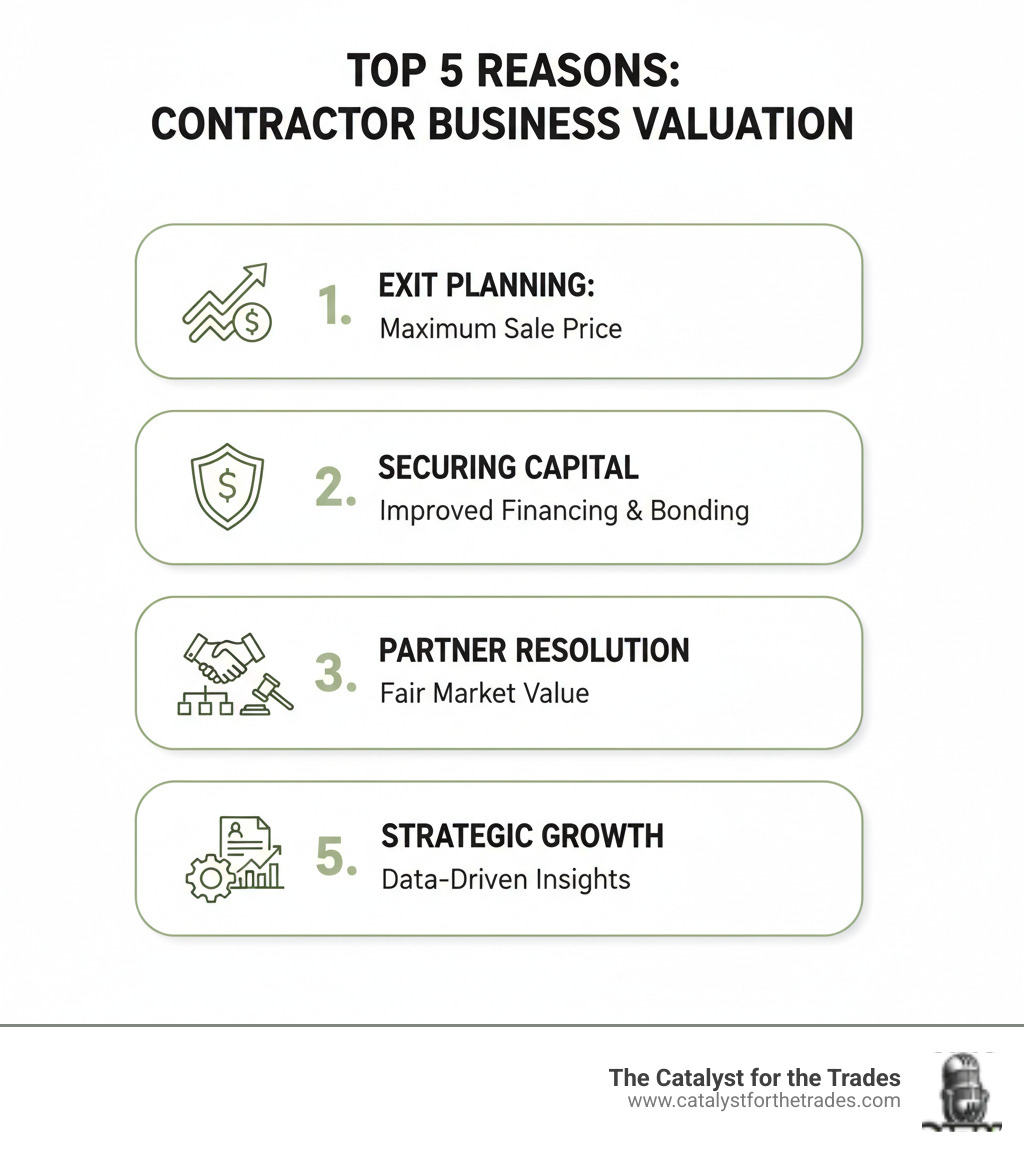Master strategic thinking: Boost decision-making, spot opportunities, and drive long-term success for leaders today!

The Contractor's Crystal Ball: Unlocking Your Business's True Value
Why Every Contractor Needs to Know Their True Business Worth
Business valuation contractors are specialists who determine a construction company's fair market value using industry-specific methods. They help owners understand their company's worth for sales, financing, partnership disputes, estate planning, and strategic growth.
What Business Valuation Contractors Do:
- Asset Valuation: Assess tangible assets like equipment and real estate, plus intangible assets.
- Financial Analysis: Review EBITDA, revenue multiples, and cash flow.
- Market Comparison: Benchmark against similar construction businesses sold recently.
- Risk Assessment: Evaluate bonding capacity, owner dependence, and operational risks.
- Compliance: Ensure valuations meet legal and tax standards like USPAP.
The construction industry is booming, with smaller contractors averaging a 25% growth rate since 2022. This makes understanding your business's value more critical than ever. Whether planning an exit, seeking financing, or making strategic moves, knowing your true worth allows you to negotiate from a position of strength.
Many owners know their revenue and equipment value but miss the bigger picture. Your reputation, customer base, bonding capacity, and operational systems all contribute significant value. The challenge is that construction valuations require specialized knowledge of industry accounting, bonding, and risk factors that general appraisers often lack.

The Foundation: Core Valuation Methods for Construction Companies
Professional business valuation contractors use multiple approaches to determine your company's true worth. Just as a house needs more than one support beam, a valuation relies on a combination of methods to provide a complete picture. We focus on going concern value—what your business is worth as an operating company—not liquidation value, which is what you'd get from selling off assets.

The Asset-Based Approach: More Than Just Your Trucks and Tools
This method sums your company's assets and subtracts its liabilities. We focus on fair market value—what your equipment is worth today—not the depreciated book value on your balance sheet. For example, an excavator with a book value of $120,000 might sell for $180,000 in the current market.
This approach also includes intangible assets like your customer database, long-term contracts, and reputation (goodwill). If you have strong client relationships that lead to direct work, that's valuable goodwill. The Adjusted Net Asset Method adjusts your balance sheet to these current market values, establishing a solid floor for your company's worth. For more on this, see How to Value a Construction Company.
The Market Approach: How Do You Stack Up?
Similar to real estate comps, this approach analyzes what other construction companies like yours have recently sold for. Using Comparable Company Analysis, we create multiples (ratios) to apply to your business.
- EBITDA multiples are the standard. EBITDA (Earnings Before Interest, Taxes, Depreciation, and Amortization) shows operating cash flow. If similar companies sell for 8x their EBITDA, and yours is $500,000, your company might be worth around $4 million. The average EV/EBITDA multiple in the construction sector is approximately 12.3x, though it varies widely.
- Seller's Discretionary Earnings (SDE) is often better for smaller firms. It adds back the owner's salary and personal expenses to show the total cash flow available to an owner-operator.
Finding truly comparable companies is key, considering size, geography, and specialty (residential vs. commercial).
The Income Approach: Projecting Future Profitability
This method values your business based on its future earning potential.
- Discounted Cash Flow (DCF) is the primary tool. We project your cash flows for 5-10 years and discount them to their present-day value. This involves forecasting revenue and expenses, then applying a discount rate that reflects the investment's risk. We also calculate a terminal value for the business's worth beyond the forecast period.
- Capitalization of Earnings is a simpler method for stable businesses, where a representative year's earnings are divided by a capitalization rate.
For construction firms, accurate projections depend on your backlog, seasonal trends, and economic cycles. Predictable earnings mean lower risk and higher value. For more on applying these methods, explore Valuation Multiples for a Construction Company.
The Blueprint for Value: Key Metrics & Industry Nuances
Valuing a construction company requires understanding industry-specific metrics that go beyond standard financial statements. Business valuation contractors with specialized expertise can identify the key performance indicators that truly drive value.

Decoding the Numbers: Financial Metrics That Matter in 2025
Certain numbers reveal your company's true health:
- EBITDA (Earnings Before Interest, Taxes, Depreciation, and Amortization) remains king because it provides a clean view of operating performance, stripping out financing and depreciation variables.
- Seller's Discretionary Earnings (SDE) is often more accurate for smaller, owner-operated firms, as it adds back the owner's salary and benefits to show total owner cash flow.
- Revenue trends are critical. Consistent growth signals you are capturing market share.
- Gross profit margin shows how well you bid jobs and control costs.
- Backlog value (signed contracts for future work) is a powerful indicator of your revenue pipeline and de-risks the investment for buyers.
- Work-in-Progress (WIP) reports reveal your project management skill. Accurate WIP reports show you control job costs and change orders.
For current market data on these metrics, see Construction Industry Valuations and EBITDA Multiples.
Unique Accounting Considerations for business valuation contractors
Construction accounting methods fundamentally change how performance appears to buyers.
- Percentage of Completion method: Recognizes revenue as work progresses, giving a realistic view of profitability on long-term contracts.
- Completed Contract method: Recognizes revenue only when a project is finished. This can defer taxes but creates volatile financial statements that are harder to value.
- Underbillings and overbillings: These unique concepts represent work completed but not invoiced (or vice-versa) and significantly impact working capital and cash flow analysis.
- Retainage: The 5-10% of billings held by clients until project completion is a significant asset that requires careful valuation.
Valuators often convert cash-basis statements to an accrual basis for a true economic picture. For more on these topics, Construction Contractors Business Valuation - GCF offers comprehensive details.
The Power of Bonding: How Surety & Bonding Capacity Drive Value
In construction, surety bonds guarantee you'll complete your work. Your bonding capacity limits the size of projects you can bid on and is a direct indicator of your financial health and credibility. Surety companies assess your financials, experience, and track record before extending credit. For a buyer, strong bonding capacity represents stability, credibility, and the ability to pursue larger, more profitable projects, which directly increases your company's valuation.
Residential vs. Commercial: Tailoring the Valuation Approach
The valuation approach differs for residential and commercial contractors due to distinct project cycles, contract complexity, customer types, and risk profiles.
- Residential contractors face shorter project cycles and a market sensitive to consumer confidence and interest rates.
- Commercial contractors handle longer, more complex projects with business or government clients, providing more stability but tied to broader economic cycles.
Specialty contractors often command higher valuation multiples than general contractors due to their specialized skills and reduced competition. An experienced business valuation contractor understands these distinctions and adjusts their analysis accordingly.
Beyond the Balance Sheet: Valuing Your Intangible Assets
A construction company's true value often lies in its intangible assets—the invisible elements that create a competitive edge and sustainable profits. These soft assets are what separate thriving businesses from those competing solely on price.

The Strength of Your Team and Reputation
Business valuation contractors know that a strong team and solid reputation can add significant worth.
- Management Effectiveness: An experienced leadership team that can steer challenges and drive growth reduces risk for a buyer.
- Skilled Workforce: In a tight labor market, a stable team with low employee turnover is a major asset, ensuring consistent project delivery and operational stability.
- Brand Recognition & Customer Relationships: A trusted brand and strong client relationships that generate referrals and repeat business are invaluable assets that drive future revenue. Your online reviews and community standing are part of this. As we discuss at The Catalyst for the Trades, you should be building a profitable business with the end in mind by nurturing these assets.
Breaking the Chains: How Owner Dependence Kills Value
If your business cannot run without you, its value is significantly lower. This key-person risk is a major red flag for buyers. They want to acquire a self-sustaining system, not buy themselves a job.
The solution is to build documented processes and Standard Operating Procedures (SOPs) for all operations. Empower your team through delegation and train others to handle key functions. This transforms you from an indispensable owner to a strategic leader. A scalable model that operates independently is far more attractive and valuable to a buyer, a concept we've explored in our episode on building your business with an exit in mind.
Leveraging Technology to Boost Your Bottom Line
Modern technology is a value multiplier. Smart business valuation contractors see tech adoption as a sign of efficiency and a competitive advantage.
- Construction management software streamlines scheduling, budgeting, and communication, leading to improved efficiency and fewer errors.
- Building Information Modeling (BIM) allows for 3D project visualization, reducing rework and demonstrating cutting-edge capabilities.
- Data-driven decision making, enabled by technology, leads to higher profit margins through smarter bidding and resource allocation.
A tech-enabled company signals to buyers that it is positioned for growth, efficiency, and adaptability, which commands a premium valuation.
Your Roadmap to Maximizing Value with business valuation contractors
Open uping your construction company's true worth requires a strategic approach. This step-by-step blueprint will help you maximize your business's value, whether you're planning an exit or positioning for growth.
Step 1: Get Your House in Order
Before seeking a valuation, ensure your business is presented professionally.
- Clean Financials: Convert your books to accrual-based accounting from a cash basis. This provides a clearer picture of your economic performance by showing when revenue was earned and expenses were incurred.
- Organized Documents: Ensure all legal documents, including licenses, permits, and insurance policies, are current and accessible.
- Documented Contracts: Keep client contracts, subcontractor agreements, and vendor relationships well-organized to demonstrate professionalism and control.
- Operational Efficiency: Document your processes to show the business can run smoothly without your constant involvement.
Smart financial planning is also key. As we've covered in our guide on year-end tax tips that actually work, a solid tax strategy impacts both cash flow and your company's ultimate value.
Step 2: Understand Your True Worth with a professional business valuation contractors
Obtain a professional assessment to determine what your business is actually worth.
- Get a Formal Valuation: Work with qualified business valuation contractors who specialize in the construction industry. Their objectivity and adherence to standards like USPAP (Uniform Standards of Professional Appraisal Practice) ensure a credible, defensible report.
- Choose the Right Appraiser: Look for credentials like ASA (Accredited Senior Appraiser), CBA (Certified Business Appraiser), CVA (Certified Valuation Analyst), or ABV (Accredited in Business Valuation). Resources like Business Appraisal & Valuation Services for Business Owners can help.
- Understand the Report: A good valuation explains the methods and assumptions used. Dig into the details to understand what drives your company's value.
- Set Realistic Expectations: A professional valuation provides an objective assessment that may differ from your personal estimate. Trust the expert analysis as your starting point for informed decisions.
Step 3: Assemble Your A-Team
Maximizing value is a team effort. Surround yourself with experienced professionals.
- M&A Advisors/Business Brokers: These specialists prepare companies for sale, find qualified buyers, and steer market conditions.
- Transaction Attorneys: They protect your legal interests, draft contracts, and handle the unique complexities of construction deals, such as bonding and license transfers.
- Your CPA: They help prepare financial statements, advise on tax implications of deal structures, and assist with the buyer's due diligence.
This team will help you prepare for due diligence and provide crucial negotiation support. For insights into market expectations, see Selling a Construction Company – Valuation Multiples for M&A.
Frequently Asked Questions about Construction Business Valuation
Here are answers to the most common questions contractors have about business valuations.
How much does a construction business valuation cost?
The cost of a valuation depends on several factors:
- Scope: A simple calculation report for internal planning is less expensive than a certified appraisal required for a sale or legal matter.
- Company Size and Complexity: A straightforward business with clean books costs less to value than a large, multi-division company with complex contracts.
- Data Availability: Organized financial records speed up the process and reduce costs. If an appraiser must reconstruct financials, the price will be higher.
Costs can range from a few thousand dollars for a basic estimate to tens of thousands for a comprehensive, court-ready appraisal. While it's an investment, it can prevent costly errors.
What is a good EBITDA multiple for a construction company?
There is no single magic number; multiples vary significantly.
- Sub-sector and Size Matter: As the Q4 2024 data below shows, multiples differ by specialty and increase with company size (as measured by EBITDA). Larger, more stable companies command higher multiples.

| Sector | EBITDA Multiples ($0-1M EBITDA) | EBITDA Multiples ($3-5M EBITDA) |
|---|---|---|
| Architecture | 6.4x | 10.7x |
| Building Materials | 5.4x | 9.8x |
| Civil Engineering | 6.8x | 11.9x |
| Electrical | 6.1x | 11.4x |
| Home Builders | 5.6x | 10.8x |
| Painting | 5.5x | 11.0x |
| Plumbing | 6.3x | 11.1x |
| PropTech | 6.5x | 11.6x |
| Real Estate | 6.1x | 11.2x |
| Roofing | 5.9x | 11.1x |
| Surveying | 5.8x | 10.7x |
- Value Drivers: Factors that increase your multiple include recurring revenue, documented processes, a strong backlog, and specialized skills.
- Value Draggers: Heavy owner dependence, inconsistent profits, and competing solely on price will lower your multiple.
Focus on building a stable, scalable business to achieve a higher valuation.
How long does a business valuation take?
The timeline depends on the report type and your level of preparation.
- Basic Calculation: A few business days, suitable for internal planning.
- Detailed Opinion of Value: One to three weeks, good for serious discussions with partners or buyers.
- Full Certified Appraisal: Four to eight weeks, necessary for sales, legal disputes, or tax purposes.
Organization is the key to a faster process. Having clean financials and organized data ready will prevent delays.
Conclusion
Understanding your construction company's true value gives you the power to shape your future. Whether you're planning retirement, seeking growth, or securing your financial standing, working with professional business valuation contractors provides essential clarity.
The construction industry is experiencing significant momentum, creating immense opportunities for contractors who know their worth and how to maximize it. This guide has covered the core valuation methods—asset-based, market, and income—and the unique industry nuances like bonding capacity and backlog value that are critical for an accurate assessment.
We've also highlighted how intangible assets like your team, reputation, and operational systems are often the biggest drivers of value. A business that can thrive independently of its owner will always command a premium. The roadmap provided offers concrete steps: get your house in order, obtain a professional valuation, and assemble a strong advisory team. These actions are essential for achieving the best possible outcome.
At The Catalyst for the Trades, our hosts Jennifer Bagley and Chuck Staszkiewicz are dedicated to helping home service businesses build lasting value by combining tech insights with real-world experience. Your company is the result of years of hard work. Understanding and improving its value builds a stronger, more profitable business today and prepares you for a successful future.
To learn more about building a financially robust business that's attractive to buyers, listen to our episode on Smart money moves.

Discover how leading home‑service companies are leveraging AI, subscription models, and digital‑first strategies.
Learn why private equity, automation, and customer‑centric tech are reshaping the trades.
Episodes you may like


Discover business acumen: core components, traits of leaders, development steps & metrics to boost decision-making and scale success.

Lead your crew to victory! Master essential contractor leadership strategies for project success, safety, and team empowerment.
.png)




